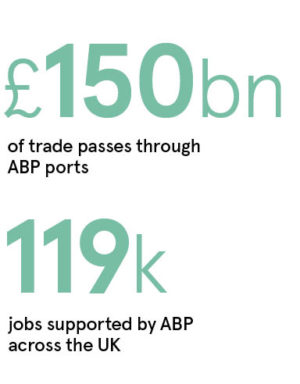
Ron Crean, Group head of marketing, ABP
For port operators worldwide, business as usual will no longer do. Increased efficiencies are required as a matter of urgency across maritime supply chains and technology is inevitably at the forefront of emerging transformations.
With Brexit approaching and the new customs declaration service being phased in by HM Revenue & Customs, the UK’s most advanced port operators are looking at how to become hubs of increased efficiency, common systems and enhanced integration. The ambition is to enable truly frictionless trade in which highly efficient systems ensure extremely smooth processes.
Among those advanced port operators is Associated British Ports (ABP), which handles around £150 billion of annual trade – £68 billion exports and £81 billion imports – around a quarter of the total UK trade in goods. It recently created the Trade Resilience Forum, which brings together government and key industry players from across the supply chain, including manufacturers, retailers, shipping lines and logistical suppliers, to discuss trade needs and processes.
These efforts are increasingly international, with work being done to expand the forum into the Netherlands and Belgium. An advanced project is also being undertaken in collaboration with the Port of Rotterdam, Port of Hull and others, which involves working together to share best practice.
“As an important trading hub with 21 ports, and supporting nearly 120,000 jobs across industries, we have the opportunity to bring all the different supply chain players together to discuss their current challenges and future requirements, and foster discussion that will lead to stable future growth,” explains Ron Crean, ABP’s group head of marketing.
ABP has stepped up its efforts around supporting customers and exploring frictionless trade, involving development of highly efficient processes for the movement of all cargo. Its solutions are being designed to be capable of optimising the performance, efficiency and resilience of international supply chains, from automotive to food to chemical industries and beyond.

Technological innovation is at the heart of improving these supply chain processes. The right systems are key to enabling frictionless trade, says Mr Crean.
“We need to make sure that everyone can integrate with systems easily, from large freight companies to smaller shipping firms,” he says. “We already work with innovative port community software providers, such as CNS and MCP, in some of our ports. This latest pilot is another strand in our quest to ensure we stay ahead of the requirements of new legislation, and the technical demands and opportunities that may arise from it.”
ABP recently began a pilot project with technology firm Marine Transport International to use blockchain technology, a digital ledger, so that systems can more easily integrate and creating, in effect, a single version of the truth for individual items of data, with fewer manual information entry processes. The project aims to enable each firm to connect seamlessly with the port operator’s systems and is potentially capable of significantly simplifying the flow of trade.
According to Mr Crean, ports have an increasingly important role to play as facilitators and enablers of trade across the supply chain. This provides an important opportunity to make sure trade continues to flow and grow in the future.
To find out more about ports of the future please visit abports.co.uk
